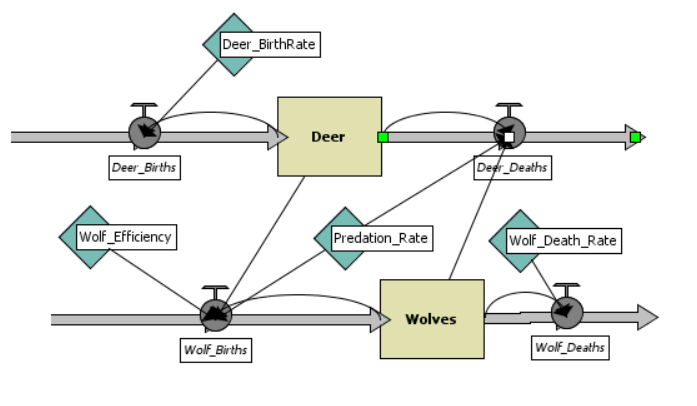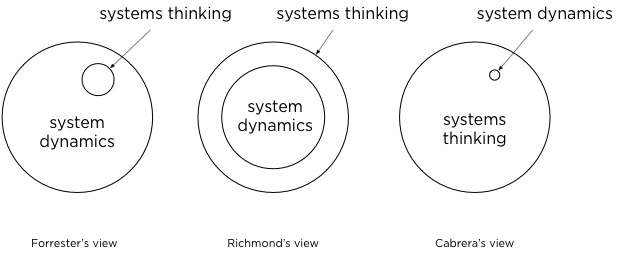PUTTING THE "SYSTEMS THINKING" IN SYSTEMS _________.
 As a doctoral student at Cornell University long ago, I TA'd an intro course in evolutionary bio for one of my advisors, an iconic evolutionary biologist and Darwin historian, Dr. Will Provine.
As a doctoral student at Cornell University long ago, I TA'd an intro course in evolutionary bio for one of my advisors, an iconic evolutionary biologist and Darwin historian, Dr. Will Provine.In the first class, in a huge lecture hall filled with Freshman, Will started with a 50 minute gauntlet of the most difficult ideas in evo bio. The students were always visibly overwhelmed and distressed, frantically scribbling notes in a hopeless attempt to keep pace.
With five minutes left in the lecture he put up a single slide with a list of the 20+ difficult ideas he had just covered. He said, "These were all the ideas I was taught in one of the best graduate schools in evolutionary biology as a doctoral student in the 1960s." Then he put up another slide and said, "And here are how many of them are still considered valid. None."
He then asked the students a single question, “If this is what I learned and none of it is true then what do you think I really learned in graduate school?"
He then asked the students a single question, “If this is what I learned and none of it is true then what do you think I really learned in graduate school?"
He paused. "What I learned was how to think like an evolutionary biologist. And, that is what I will teach you in the course."
I tell this story because I think it beautifully addresses the question: What does it mean to be a discipline or field that has the modifier "Systems" as in Systems ______? There are currently 89 such fields (see list below). Systems Engineering (SE), for example, is one of them. Systems Engineering is a very important discipline. But so often the case is that programs miss what that modifier means, thus the change in name is merely cosmetic. I once had a memorable conversation with Mike Kwinn and Greg Boyland at the USMA SE, where we reflected on a frustrating reality: we can teach students numerous systemic techniques and tools, but if they lack a systemic mindset, those tools end up being used in a non-systemic way—leading to non-systemic solutions.
To put the "Systems" in Systems ______, we need credible, validated evidence of what systems thinking is and what works in terms of developing it as a skill. Systems Thinking is, in effect, the field of study that puts the "systems" in Systems Engineering and these 89 other fields.
I tell this story because I think it beautifully addresses the question: What does it mean to be a discipline or field that has the modifier "Systems" as in Systems ______? There are currently 89 such fields (see list below). Systems Engineering (SE), for example, is one of them. Systems Engineering is a very important discipline. But so often the case is that programs miss what that modifier means, thus the change in name is merely cosmetic. I once had a memorable conversation with Mike Kwinn and Greg Boyland at the USMA SE, where we reflected on a frustrating reality: we can teach students numerous systemic techniques and tools, but if they lack a systemic mindset, those tools end up being used in a non-systemic way—leading to non-systemic solutions.
To put the "Systems" in Systems ______, we need credible, validated evidence of what systems thinking is and what works in terms of developing it as a skill. Systems Thinking is, in effect, the field of study that puts the "systems" in Systems Engineering and these 89 other fields.
Core Systems Disciplines
- Systems Science
- Systems Thinking
- Systems Theory
- Systems Analysis
- Systems Modeling
- Systems Design
- Systems Research
- Systems Evaluation
Systems in Engineering & Technology
- Systems Engineering
- Systems Architecture
- Systems Cybernetics
- Systems Robotics
- Systems Control Engineering
- Systems Informatics
- Systems Computing
- Systems Communication
- Systems Integration
- Systems Manufacturing
- Systems Automation
- Systems Software Engineering
- Systems Artificial Intelligence
- Systems Complexity Engineering
- Systems Mechatronics
- Systems Electrical Engineering
- Systems Design Engineering
Systems in Natural & Physical Sciences
- Systems Biology
- Systems Ecology
- Systems Neuroscience
- Systems Chemistry
- Systems Physics
- Systems Geology
- Systems Medicine
- Systems Pharmacology
- Systems Hydrology
- Systems Meteorology
- Systems Biophysics
Systems in Social & Behavioral Sciences
- Systems Psychology
- Systems Sociology
- Systems Anthropology
- Systems Economics
- Systems Political Science
- Systems Cognitive Science
- Systems Linguistics
- Systems Philosophy
Systems in Business, Management & Decision-Making
- Systems Management
- Systems Decision Science
- Systems Operations Research
- Systems Organizational Development
- Systems Leadership
- Systems Strategy
- Systems Risk Management
- Systems Financial Analysis
- Systems Entrepreneurship
Systems in Education & Knowledge Fields
- Systems Pedagogy
- Systems Learning Science
- Systems Curriculum Design
- Systems Knowledge Management
- Systems Information Science
- Systems Education Policy
Systems in Environmental, Sustainability, and Policy Fields
- Systems Resilience
- Systems Sustainability
- Systems Climate Science
- Systems Agriculture
- Systems Urban Planning
- Systems Disaster Management
- Systems Resource Management
- Systems Environmental Science
Systems in Health & Medicine
- Systems Epidemiology
- Systems Public Health
- Systems Immunology
- Systems Healthcare Management
- Systems Geriatrics
- Systems Nutrition
- Systems Psychiatry
- Systems Medical Informatics
Systems in Military, Security & Crisis Management
- Systems Warfare
- Systems Intelligence Analysis
- Systems Cybersecurity
- Systems Resilience Planning
- Systems Emergency Response
- Systems Tactical Analysis
- Systems Defense Strategy
Other Notable Systems Fields
- Systems Art & Design
- Systems Ethics
- Systems Legal Studies
- Systems Cultural Studies
- Systems Journalism
- Systems Transportation
- Systems Musicology
.png?width=150&height=150&name=CRL%20GOAT%20Logo%20(4).png)


